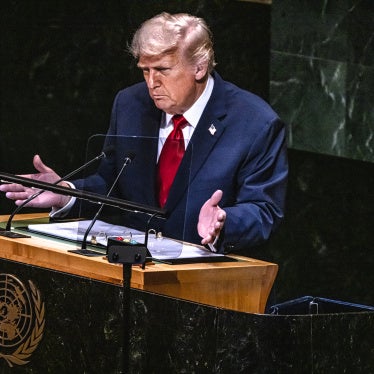Attorney General of the United States
U.S. Department of Justice
Washington, DC
Dear Mr. Attorney General:
Human Rights Watch writes to present our recommendations in reaction to the comprehensive report submitted on August 20, 2010 by the government of the United States to the United Nations High Commissioner for Human Rights as a part of the Universal Periodic Review (UPR) procedures of the UN Human Rights Council.
As part of the US government's preparations for the August report, a delegation from various US government departments engaged in an unprecedented series of consultations in Arizona, Alabama, California, Illinois, Louisiana, Michigan, New York, Texas, and Washington, D.C., in order to hear from members of the public on human rights concerns. We would like to commend the United States for instituting these consultations. We would also like to acknowledge the detailed and analytical reports submitted to the council and the US government by hundreds of organizations from US civil society, including Human Rights Watch.[1] These meetings and written submissions represent an outpouring of engagement from people and institutions in the United States on the successes and failures of the government to uphold its obligations under international human rights law to all persons within its power or effective control.
The 29-page US government report represents an important effort to frame a series of human rights issues facing the country. This is a difficult task, especially given the length limitations all governments must follow as a part of the Universal Periodic Review process. The report offers significant discussion of the United States' achievements and best practices in protecting and promoting human rights.
However, the integrity of the UPR process hinges upon the willingness of governments to acknowledge the human rights challenges they face. The United States does this in certain instances in the report, particularly in relation to racial discrimination, economic disadvantage, and the treatment of minority groups. Nevertheless, we are concerned that the report, when discussing a particular human rights issue or achievement, often fails to acknowledge ongoing human rights challenges central to that same topic. We offer our insight into these human rights challenges, and provide recommendations for change below.
Making Rights a Reality in US Law
The US report offers a lengthy discussion of the history of the United States and its tradition of individual rights. It appropriately draws linkages between rights protected in the US Constitution and those protected under international human rights law. We acknowledge that in some cases, as the report notes, US constitutional rights "go beyond those guaranteed in international law"; at the same time, there are important rights under international law that are not fully protected in the Constitution. This is why ongoing participation of the United States in the UPR process, and concentrated attention paid by the US government to implementation and enforcement of its existing human rights obligations, as well as ratification of important additional international human rights treaties, including those mentioned as priorities in the report, are required to ensure human rights protections for all persons within the power or effective control of the United States.
The United States should ratify international human rights treaties, including: International Covenant on Economic, Social and Cultural Rights; the Convention on the Elimination of All Forms of Discrimination against Women; the Convention on the Rights of the Child; the International Convention for the Protection of All Persons from Enforced Disappearance; and the Convention on the Rights of Persons with Disabilities. The United States should also take vigorous steps to bring its domestic legislation at both the national and state levels in line with international treaty obligations. Finally, the United States should withdraw all reservations, understandings, and declarations that have weakened human rights protections for all persons subject to US authority or effective control.
Juvenile Life without Parole
While the US report references the important Supreme Court case of Graham v. Florida, abolishing the imposition of life without parole or release (known as LWOP) sentences on persons under the age of 18 who did not commit homicide, it does not mention that no more than 10 percent of the 2,574 youth offenders serving the sentence will be affected by the ruling.[2] The report fails to acknowledge the significant opposition to the appropriateness of this sentence for any child convicted of any crime. Nor does it confront the fact that black youth are serving LWOP in the United States at a per capita rate 10 times higher than white youth.
The United States should discontinue the use of life sentences without parole for all persons below the age of 18 at the time the offense was committed, and review the situation of persons already serving such sentences.
Abuses in Immigration Detention
While the US report offers a description of recent efforts to overhaul immigration detention in the United States, it fails to acknowledge that serious human rights abuses continue in immigration detention centers.[3] These abuses include: deaths and poor health of detainees as a result of inadequate medical care (including for women detainees, detainees with HIV/AIDS, and lesbian, gay, bisexual, transgender, and gender non-conforming detainees); sexual abuse of immigrant detainees; detaining individuals who pose no flight risk or danger; transferring detainees significant distances away from their attorneys, evidence, and witnesses; and subjecting immigrant detainees with mental disabilities to lengthy periods of detention.
The United States should ensure that there are individual and justifiable reasons for any deprivation of liberty imposed on a non-citizen, and enact detailed standards on the conditions and treatment of immigrant detainees that are enforceable in court.
Treatment of Trafficking Victims
The US report offers several paragraphs to describe its significant efforts to end trafficking of persons, and provide assistance to victims, but it provides no acknowledgement that the government regularly places vulnerable women and girls who have been trafficked into prison-like conditions in immigration detention centers throughout the United States.[4] Detaining survivors of trafficking undermines the objectives of the Trafficking Victims Protection Act and puts the health of survivors at risk. Detention in the US immigration system has been shown to undermine the mental health of persons who have survived trauma, such as victims of trafficking.
The United States, consistent with its Trafficking in Persons Report, should adopt measures to identify victims of trafficking and ensure that they are not held in immigration detention facilities.
Conviction-Based Disenfranchisement
The US report details the historical strides made to ensure that citizens of the United States have the right to vote, including through the enactment of the Voting Rights Act of 1965. Nevertheless, it does not address that criminal-conviction-based disenfranchisement laws deprive over 5.3 million people, one in 40 adults, of the right to vote, disproportionately affecting minorities and their communities. In the five states that deny the vote even to those individuals who have completed their sentences, one in four African-American men is permanently disenfranchised.[5]
The United States should remove conviction-based restrictions on voting rights at the state and federal level.
Racial Discrimination in Criminal Justice
The US report mentions its achievement in passing the Fair Sentencing Act-important legislation championed by the Obama administration, enacted in August 2010, which alters the historically far more punitive approach to federal crack cocaine offenders that led to racial disparities in sentencing. However, the report contains no acknowledgement of the widespread racial disparities that permeate drug law enforcement at all levels. Federal surveys and other research indicate that blacks engage in drug offenses at roughly the same rate as whites. But law enforcement has targeted urban minority neighborhoods with the result that, according to Human Rights Watch's research, drug arrest rates for African-American adults were 2.8 to 5.5 times as high as those of whites in every year from 1980 through 2007, and blacks today enter state prison on drug charges at 10 times the rate of whites.[6]
While the Fair Sentencing Act is an important first step, the US should monitor any disproportionate impact of drug law enforcement on black communities, and identify and eliminate the causes of such disparate impact.
Treatment of Prisoners
With the highest incarceration rate in the world, the United States faces an enormous human rights challenge in ensuring the safety and dignified treatment of the some 2.4 million prisoners in custody on any given day. The US report contains little discussion of some of the most egregious human rights concerns facing US prisoners, including the overcrowded facilities devoid of rehabilitative opportunities, the large numbers of mentally ill persons being held in solitary confinement in US prisons, the failure to provide prisoners with adequate medical and mental health care, and the ongoing and often insurmountable impediments placed by the Prison Litigation Reform Act on prisoners' abilities to secure a remedy for ill-treatment.[7] While the work of the National Prison Rape Elimination Commission, on which one of our staff participated as a commissioner, has been very positive, the Department of Justice has failed to move expeditiously as required by the Prison Rape Elimination Act to promulgate standards that will prevent, investigate and punish sexual violence against inmates by staff or other inmates.
The United States should take all appropriate action to ensure that every prisoner is treated humanely and with dignity; it should amend the Prison Litigation Reform Act so that prisoners have access equal with non-prisoners to the courts and to compensatory remedies; it should take steps to ensure that any prisoner who has or develops symptoms of a serious mental illness is not held under conditions of solitary confinement for more than a brief period of time; and it should ensure that all prisoners receive adequate medical and mental health care. The Department of Justice should promptly enact binding standards in conformity with the recommendations of the National Prison Rape Elimination Commission.
Accountability for Detainee Abuse
Three executive orders relating to the detention and transfer of terrorist suspects, issued on President Barack Obama's second full day in office, were important steps toward bringing US policy into compliance with international human rights standards. The United States rightfully underscores the issuance of these orders in its report, part of its stated commitment to have no "law-free zones." Yet nowhere in the report does the United States discuss what steps it has taken-or not taken-to prosecute past human rights violations. Despite noting its obligations under the Convention against Torture and Other Cruel, Inhuman or Degrading Treatment or Punishment to investigate and prosecute those responsible for official torture, the United States does not identify any government officials who have been investigated or prosecuted for planning, authorizing, or perpetrating acts of torture or other ill-treatment against detainees. Nor does the report discuss the failure of the United States to comply with its obligation to provide compensation and other redress to victims of serious past abuses, as exemplified by the case of Canadian national Maher Arar.[8]
The United States should immediately investigate and appropriately prosecute those who planned, authorized or perpetrated torture and other ill-treatment, and should ensure victims have an effective remedy.
Transfer Policy
The US report acknowledges that while the United States has reviewed its detainee transfer policies to ensure persons are not transferred to countries where they face torture, it has not publicly issued a revised policy that contains the necessary protections for detainees' human rights.
The United States should issue a formal policy on detainee transfers that ensures that no person in US custody is transferred to the custody of another state where he or she faces a real risk of torture or other ill-treatment, and it should provide any person facing transfer to the custody of another government the opportunity to challenge the transfer before a court.
Continued Detention of Terrorism Suspects
The report asserts that the laws of war permit the United States to hold indefinitely persons captured or arrested in locations around the world, even far from any traditional battlefield, if they have the requisite connection with the Taliban, al Qaeda or associated forces. The report fails to specifically acknowledge, however, that the Obama administration has already publicly stated it intends to continue to hold indefinitely at least 48 individuals who are detained without trial at Guantanamo Bay and who have already been in US custody for approximately eight years. It also does not acknowledge that the United States holds an additional 57 detainees from Yemen who have been cleared by the administration for repatriation because it imposed a moratorium on such transfers following an attempted attack on a US jetliner in December 2009, by a Nigerian man who allegedly trained with al Qaeda in Yemen. Additionally, the United States does not provide a clear plan for Guantanamo's closure, despite the Obama administration's promise to make closing the facility a priority.
The United States should continue to repatriate (or, where appropriate, resettle) all detainees not deemed suitable for criminal prosecution, and close Guantanamo.
Flawed Military Commissions
The US report notes the 2009 revisions to the military commission procedures that eliminated several major flaws. Yet even with these improvements the military commissions continue to lack the basic guarantees of fairness found in US federal courts, and are used to prosecute people for conduct that has never before been considered a violation of the laws of war, raising serious retroactivity concerns. The military commissions also have jurisdiction only over non-citizens, raising equal protection concerns; they still may permit the use of evidence obtained through torture; and they make no provisions for treating juveniles differently from accused adult offenders as appropriate under international law.
The United States should prosecute in US federal court all detainees deemed suitable for prosecution, and should cease the use of military commissions, especially in cases involving juvenile offenders.
***
Human Rights Watch considers the US government's first report to the Universal Periodic Review a constructive first step. We recognize that the United States has faced some negative backlash for producing this report because of the handful of self-critical statements it contains. We encourage the United States to withstand that criticism, and in response to deepen its commitment to identify and ameliorate the human rights challenges facing the country. The US should also assure participating member states that it encourages an atmosphere of open exchange and dialogue during its review session. Only through such constructive engagement on its own human rights record will the United States be fulfilling the purposes of the Universal Periodic Review.
Sincerely,
Alison Parker
Director
US Program
[1] Human Rights Watch, Submission to the Universal Periodic Review Process for the United States, March 31, 2010, https://www.hrw.org/en/news/2010/04/19/submission-universal-periodic-review-united-states.
[2] Human Rights Watch, "When I Die They'll Send Me Home": Youth Sentenced to Life Without Parole in California, vol. 20, no. 1(G), January 2008, https://www.hrw.org/en/reports/2008/01/13/when-i-die-they-ll-send-me-home; Human Rights Watch, Executive Summary: The Rest of Their Lives: Life without Parole for Youth Offenders in the United States in 2008, May 1 2008, https://www.hrw.org/en/reports/2008/05/01/executive-summary-rest-their-lives; Human Rights Watch, The Rest of Their Lives: Life Without Parole for Child Offenders in the United States, https://www.hrw.org/en/reports/2005/10/11/rest-their-lives-0.
[3] Human Rights Watch, Detained and at Risk: Sexual Abuse and Harassment in United States Immigration Detention, August 25, 2010, https://www.hrw.org/en/reports/2010/08/25/detained-and-risk-0; Human Rights Watch and American Civil Liberties Union, Deportation by Default: Mental Disability, Unfair Hearings, and Indefinite Detention in the US Immigration System, July 25, 2010, https://www.hrw.org/en/reports/2010/07/26/deportation-default-0; Human Rights Watch, Costly and Unfair: Flaws in US Immigration Detention Policy, May 6, 2010, https://www.hrw.org/en/reports/2010/05/06/costly-and-unfair-0; Human Rights Watch, Locked Up Far Away: The Transfer of Immigrants to Remote Detention Centers in the United States, December 2, 2009, https://www.hrw.org/en/reports/2009/12/02/locked-far-away-0; Human Rights Watch, Forced Apart (By the Numbers): Non-Citizens Deported Mostly for Nonviolent Offenses, April 15 2009, https://www.hrw.org/en/reports/2009/04/15/forced-apart-numbers-0.
[4] Letter from Human Rights Watch to Mark Taylor, Senior Coordinator, Office to Monitor and Combat Trafficking in Persons, United States Department of State, April 19, 2010, https://www.hrw.org/en/news/2010/04/19/us-victims-trafficking-held-ice-detention.
[5] American Civil Liberties Union, "Race & Ethnicity in America: Turning a Blind Eye to Injustice," December 2007, http://www.aclu.org/files/pdfs/humanrights/cerd_full_report.pdf.
[6] Human Rights Watch, Decades of Disparity: Drug Arrests and Race in the United States, March 2, 2009, https://www.hrw.org/en/reports/2009/03/02/decades-disparity-0; Human Rights Watch, Targeting Blacks: Drug Law Enforcement and Race in the United States, May 4, 2008, https://www.hrw.org/en/reports/2008/05/04/targeting-blacks-0.
[7] Human Rights Watch, No Equal Justice: The Prison Litigation Reform Act in the United States, June 16, 2009, https://www.hrw.org/en/reports/2009/06/16/no-equal-justice-0; Human Rights Watch, Ill-Equipped: U.S. Prisons and Offenders with Mental Illness, October 21, 2003, https://www.hrw.org/en/reports/2003/10/21/ill-equipped-0; Plata v. Schwarzenegger, 603 F.3d 1088 (2010).
[8] Andrea Prasow, Human Rights Watch, "Denying Arar opportunity for redress undermines US justice system ," February 6, 2010, https://www.hrw.org/en/news/2010/02/06/denying-arar-opportunity-redress-undermines-us-justice-system.





